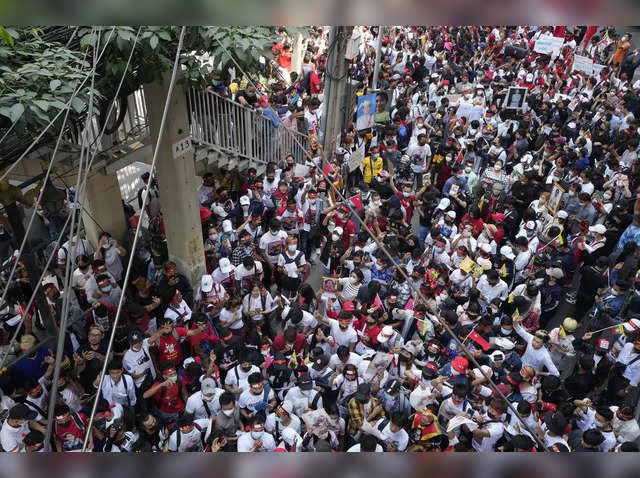By Girish Linganna
Three naval vessels from China have arrived in Myanmar to conduct joint exercises with the Myanmarese Navy, according to the country’s military leadership. This comes at a time when tensions over a border dispute have strained relations between Myanmar and China, considered Myanmar’s key ally; and also, significantly, when the South-East Asian nation’s ruling military junta is fast losing ground in its north-east border region to an alliance of ethnic minority insurgents which also has strong ties with Beijing.
On Monday (November 27, 2023), state media reported that the Chinese vessels—destroyer Zibo, frigate Jing Zhou and supply ship Qian Dao Hu—carrying a ‘naval task force’ of 700 sailors, docked at Thilawa port in Myanmar. Their mission, according to Myanmar’s military junta’s information team, is to take part in “naval security exercises” between Myanmar and China, although specific details of the drills and when they would commence have not been provided.
A destroyer—a large, fast and heavily armed naval warship—is equipped with advanced weapons systems to engage multiple targets and focuses on offensive operations. A frigate—a medium-size warship equipped with weapons and sensors that is more manoeuvrable than a destroyer—specializes in escorting larger ships and anti-submarine warfare. And a supply vessel—also known as a replenishment ship or fleet replenishment oiler—supplies fuel, ammunition and provisions and provides other logistical support to naval ships and aircraft.
Myanmar’s military seized power from an elected government in February 2021 and has since been in armed conflict with pro-democracy forces and armed ethnic factions. Beijing is a significant ally of Myanmar’s military leadership and provides weapons to them. Interestingly, China has chosen not to classify their seizure of power in 2021 as a ‘coup’.
Relations between the two have faced challenges lately as the military junta confronts a coalition of ethnic minority factions in an area near the border with China. In Yangon—the largest city and former capital of Myanmar (erstwhile Burma)—a protest took place earlier this month where demonstrators accused China of supporting the armed militias. Analysts suggest that this protest had the tacit approval of the military junta, which has claimed that these ethnic groups are deploying Chinese-made drones in their offensive, resulting in the capture of trade centres and numerous military posts in the northern Shan state.
Without disclosing specifics, China has reported that the ongoing fighting has resulted in casualties on its side of the border. Beijing has expressed its disapproval and criticism of the conflicts occurring in Shan state. This region is significant as it houses vital oil and gas pipelines that serve China, as well as a proposed billion-dollar railway connection.
China accuses some of its citizens and officials of the United Wa State Party (UWSP)—a political party and armed group based in the Wa Self-Administered Division of Myanmar, an autonomous region in Shan state—of running online scam operations in Myanmar’s border areas. The UWSP represents and advocates for the interests of the predominantly ethnic Wa people, who reside primarily in the northern part of Shan state.
The UWSP has controlled the Wa region through its military wing, the United Wa State Army (UWSA)—one of the largest and most powerful ethnic armed groups in Myanmar. The party has been involved in various peace negotiations with the central government, striving for autonomy and self-governance for the Wa people within the framework of the Myanmarese state.
The scam operations that China accuses some of its citizens and UWSP officials of indulging in involve kidnapping or luring people from China and other countries to work as telephone operators, computer programmers and other jobs as part of online fraud rackets. China has issued arrest warrants against 23 financial backers and 28 UWSP officials, including Chen Yanban and Xiao Yankui, who are believed to be the masterminds of the scam industry.
Beijing has also expressed dissatisfaction over the military junta’s inability to effectively address the issue of online scam operations in Myanmar’s border areas, often targeting Chinese individuals. Additionally, China has established a temporary border control zone in Tengchong city to prevent people from crossing the border illegally to join—or escape from—the scam operations. China has cooperated with Myanmar, Thailand and Laos to crack down on the scam activities and extradite the suspects to China.
China initiated military exercises to improve combat readiness and emergency response near the border with Myanmar on Saturday (November 25, 2023) following an incident in which a compound in the border town of Muse—capital of Mu Se Township in Shan state adjacent to China—was attacked and several towns captured, besides the key Kyin San Kyawt trading post, by the ‘Three Brotherhood Alliance’, as the insurgents call themselves, resulting in the destruction of over a hundred vehicles.
The Alliance is a coalition of three armed groups representing ethnic minorities—the Arakan Army, Myanmar National Democratic Alliance Army, and the Ta’ang National Liberation Army—formed in June 2019. The ongoing offensive has mobilized other opponents of the military junta in Myanmar. Emboldened by the northern offensive, pro-democracy militias have increased attacks on government security forces elsewhere in the country. The conflicts have expanded to different regions in the east and west of the country, leading to the displacement of approximately 335,000 individuals from their homes, as reported by the United Nations. (IPA Service)
(The author is a Defence, Aerospace & Political Analyst based in Bengaluru.)




 Workers And Farmers Organised Three Day Agitation From November 26 To 28
Workers And Farmers Organised Three Day Agitation From November 26 To 28 